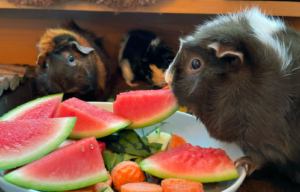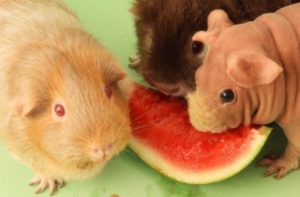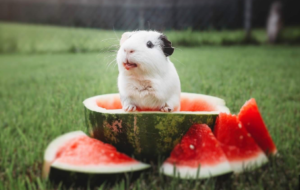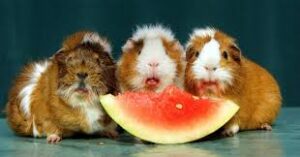Guinea pigs are beloved pets known for their adorable squeaks and lively personalities. As responsible pet owners, it’s essential to provide them with a balanced diet to keep them healthy and happy. One question that often comes up is whether guinea pigs can eat watermelon. Watermelon is a juicy and refreshing treat for humans, but is it safe for your furry friend?
In this article, we will explore whether guinea pigs can eat watermelon, the potential benefits and risks, and how to safely offer this fruit to your pet. This vet-approved guide will also answer common questions about watermelon in your guinea pig’s diet.
Can Guinea Pigs Eat Watermelon?

Yes, guinea pigs can eat watermelon in moderation. However, there are important things to keep in mind. Watermelon is high in water content and contains natural sugars, which means it should be offered as an occasional treat rather than a regular part of their diet.
While the fruit itself is safe for guinea pigs, the rind and seeds can pose risks. Let’s break down the benefits and potential dangers of feeding watermelon to your guinea pig.
Read more articles : Are Raspberries Safe for Guinea Pigs?
Nutritional Value of Watermelon
Watermelon is primarily composed of water (about 92%) and contains essential vitamins and minerals, including:
| Nutrient | Amount (per 100g) | Benefits for Guinea Pigs |
| Water | 91.5g | Keeps guinea pigs hydrated |
| Vitamin C | 8.1mg | Supports immune health |
| Vitamin A | 28µg | Promotes healthy vision |
| Potassium | 112mg | Helps maintain proper muscle function |
| Fiber | 0.4g | Aids in digestion |
Benefits of Feeding Watermelon to Guinea Pigs

Watermelon can offer some health benefits to your guinea pig when given in moderation. Here are a few ways this fruit can be beneficial:
1. Hydration
Due to its high water content, watermelon can help keep your guinea pig hydrated, especially during hot summer months. Guinea pigs can be prone to dehydration, so offering a small piece of watermelon can be a refreshing treat.
2. Vitamin C Boost
Guinea pigs cannot produce their own vitamin C, making it essential to provide this nutrient through their diet. Watermelon contains a small amount of vitamin C, which can contribute to your pet’s overall health and help prevent scurvy.
3. Low-Calorie Treat
Compared to other fruits, watermelon is relatively low in calories. This makes it a good option for an occasional treat that won’t contribute significantly to weight gain.
Risks of Feeding Watermelon to Guinea Pigs

While watermelon can be a tasty treat, there are some potential risks associated with feeding it to guinea pigs:
1. High Sugar Content
Watermelon contains natural sugars, which can be problematic for guinea pigs if consumed in large quantities. Too much sugar can lead to obesity, dental issues, and digestive problems.
2. Digestive Issues
Guinea pigs have sensitive digestive systems. Feeding them too much watermelon can cause diarrhea or an upset stomach. It’s important to offer only small portions to avoid these issues.
3. Choking Hazard from Seeds
Watermelon seeds can pose a choking hazard to guinea pigs. Always ensure that the watermelon you offer is seedless or that you remove all seeds before feeding it to your pet.
4. Potential Pesticide Exposure
Like many fruits, watermelons can be treated with pesticides. Make sure to wash the fruit thoroughly before offering it to your guinea pig to reduce the risk of pesticide exposure.
How to Safely Feed Watermelon to Guinea Pigs

If you decide to give your guinea pig watermelon, follow these steps to ensure it’s safe:
Step 1: Choose Fresh, Ripe Watermelon
Select a fresh, ripe watermelon that is free from any signs of spoilage or mold.
Step 2: Wash the Watermelon Thoroughly
Wash the watermelon under running water to remove any dirt, bacteria, or pesticides.
Step 3: Remove Seeds and Rind
Cut the watermelon into small, bite-sized pieces. Remove all seeds and the rind before offering it to your guinea pig. The rind is tough and difficult for guinea pigs to digest, and seeds can pose a choking hazard.
Step 4: Offer a Small Portion
Start with a small piece (about 1-inch cube) to see how your guinea pig reacts. Observe them for any signs of digestive upset.
Step 5: Monitor Your Guinea Pig
Keep an eye on your guinea pig after they eat watermelon. If they show signs of diarrhea or any other digestive issues, stop feeding it immediately.
How Often Can Guinea Pigs Eat Watermelon?

Watermelon should be an occasional treat for your guinea pig. Limit the serving to once or twice a week, and only in small amounts. Remember, their primary diet should consist of hay, fresh vegetables, and a small number of pellets.
Frequently Asked Questions (FAQ)
1. Can Guinea Pigs Eat Watermelon Rind?
No, it’s best to avoid feeding watermelon rind to guinea pigs. The rind is tough and can be difficult for them to digest. It also may contain pesticides or chemicals that could harm your pet.
2. Can Guinea Pigs Eat Watermelon Seeds?
No, watermelon seeds should be removed before feeding the fruit to your guinea pig. Seeds can pose a choking hazard and are not safe for guinea pigs to consume.
3. Can Baby Guinea Pigs Eat Watermelon?
It’s best to avoid giving watermelon to baby guinea pigs until they are at least 3 months old. Their digestive systems are still developing, and introducing sugary fruits too early can cause issues.
4. How Much Watermelon Can I Give My Guinea Pig?
Offer only a small piece of watermelon (about 1-inch cube) once or twice a week. Overfeeding can lead to digestive problems and weight gain.
5. Can Guinea Pigs Eat Other Fruits?
Yes, guinea pigs can eat other fruits in moderation. Some safe fruits include:
- Apples (without seeds)
- Blueberries
- Strawberries
- Pears (in small amounts)
- Bananas (in moderation)
Always introduce new fruits gradually and observe your guinea pig for any adverse reactions.
Conclusion
Guinea pigs can enjoy watermelon as an occasional treat, but it should never replace their primary diet of hay, fresh vegetables, and pellets. While watermelon offers hydration and a small boost of vitamin C, its high sugar content can cause health issues if given too frequently.
Always ensure that the watermelon you offer is seedless, rind-free, and given in small portions. Monitor your guinea pig’s reaction to new foods, and consult a veterinarian if you notice any signs of digestive upset.
By following these guidelines, you can safely treat your guinea pig to a refreshing bite of watermelon while keeping their health and well-being in check.
